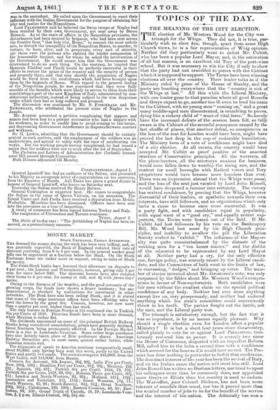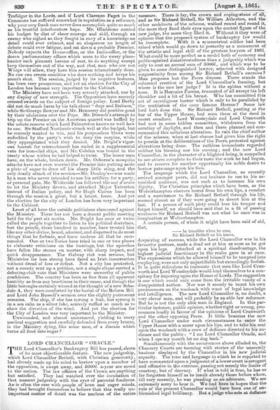TOPICS OF THE DAY.
THE MEANING OF THE CITY RUCTION.
THE election of Mr. Western Wood for the City was triumph for the Whigs. They did not, it is true, par- ticularly wish to elect him, though, apart from some Trgh Church views, be is a fair representative of Whig opinion. Neither did they particularly want to defeat Mr. Cubitt, who has been a popular Lord Mayor, and, in the estimation of all but masons, is an excellent old Tory of the port-wine school. But it was necessary to win the City if only to show that the party had not crumbled to pieces with the Cabinet which it is supposed to support. The Tories have been winning elections all over the country. Their leader talks as if the Ministry ruled by grace of the House of Stanley, and the party are boasting everywhere that the "country is sick of the Whigs at last." All this while the Liberal Ministry, with one leader gone to that paradise where all good Russells and Greys expect to go, another too ill even to lend his name to the Cabinet, with no young men "coming on," and a great many middle-aged men discontented, is crumbling to pieces, dying like a rickety child of" want of vital force." So keenly have the incessant defeats of the session been felt, so fully aware is the Cabinet of the scornful annoyance caused by the last shuffle of places, that another defeat, so conspicuous as the loss of the seat for London would have been, might have proved the last drop in the cup of endurable humiliation. The Ministry born of a vote of confidence might have died of a city election. At all events, the country would have accepted Mr. Cubitt as proof positive of the asserted reaction of Conservative principles. All the waverers, all the place-hunters, all the attorneys anxious for business, would have fallen down to worship the rising sun, and the contest for small boroughs with Radical voters and Tory proprietors would have become more hopeless than ever. There was an impression abroad that the Whigs were passe, and the loss of the seat just vacated by Lord John Russell, would have deepened a rumour into certainty. The victory has revived confidence by proving that the Whigs, however distrustful of their leaders, or apathetic toward: their own interests, have still followers, and an organization which only lacks a cause to become once more successful. It was a party fight, and with candidates equal in popularity, with equal want of a "good cry," and equally ardent sup- porters, the Tories were beaten out of the field. If Mr. Cubitt had lost followers by his vote on the Bankruptcy Bill, Mr. Wood lost more by his High Church prin- ciples, and inability to swallow the pill the Liberation Society wished to "exhibit." The influence of the Mayor- alty was quite counterbalanced by the distaste of the working men for a "ten hours master," and the dislike of the educated to be represented by any Lord Mayor at all. Neither party had a cry, for the only effective one, foreign policy, was scarcely raised by the Liberal candi- date, and the Committees of both went to the limits of law, in canvassing, "dodges," and bringing up votes. The num- ber of stories invented about Mr. Greatorex's vote, was only surpassed by the fables about Mr. Western Wood's compro- mises in favour of Non-conformists. Both candidates were fair men without the smallest claim on the special political confidence of any body. Neither had ever done anything except live on, very prosperously, and neither had endured anything which his rival's committee could conveniently throw in his teeth. The parties fought out the battle, not the men, and the Liberal party won. The triumph is satisfactory enough, but the fact that it was so important, is by no means equally pleasant. Why should a single election even for Loudon affect a popular Ministry ? it is but a short four years since thewountrz, called plainly to vote for or against Lord Palmerston, voci- ferously restored him to power. It is scarcely two since the House of Commons, disgusted with an imperfect Reform Bill, called him to the helm a second time with a confidence which seemed for the hour as if it would have no end. The Pre- mier has done nothing in particular to forfeit that confidence. The dominant interest of the year has been the revival of Italy, and on the Italian cause the nation will trust him still. Lord John Russell has written no Durham letters, nor tried to upset his colleagues more than he commonly does, nor appointed more Greys or Mots than the country is used to endure. The War-office, pace Colonel Dickson, has not been more tolerant of scandals than usual, nor has it proved more than the wonted number of jobs to be for the benefit of the service and the interest of the nation. The Admiralty has won a Trafalgar in the Lords, and if Lord Clarence Paget in the Commons has suffered somewhat in reputation as a reformer, why your very frank man never does accomplish quite so much as his trustful interlocutors hope. Mr. Gladstone carried his budget by dint of sheer courage and skill, through an enemy who sighed as they fought in envy of a knowledge no detail could ever exhaust, and an eloquence no length of debate could ever fatigue, and sat down a probable Premier. Nobody expects the Home-office, or the lndia-office, or the dozen parliamentary offices vvhich seem to the weary place- hunter such pleasant havens of rest, to do anything except keep themselves out of the way, and Mat, men who are not Whigs will allow, they have this session triumphantly done. No one can create enmities who does nothing and keeps his mouth shut. The session, judged by its negative features, has been very prosperous, and yet an election for the City of London has become very important to the Cabinet. The Ministry have not been very severely attacked, nor by any display of new strength. The Opposition have scarcely crossed swords on the subject of foreign policy. Lord Derby did not do much harm by his talk about "dogs and Italians," while Sir George Bowyer and Mr. Hennessy did positive good by their ululations over the Pope. Mr_ Disraeli's attempt to trip up the Premier on the American quarrel was baffled by the astute reserve which Lord Palmerston knows so well how to use. Sir Stafford Northcote struck well at the budget, but he scarcely wanted to win, and his purposeless blows were enfeebled by the party's wish to deny the surplus, while they appropriated what they denied. Mr. Bright's vigor- ous hurrah for retrenchment has ended in a supplemental vote for iron-clad ships, and Mr. Cobden was bound in the treaty whose withes he had helped to twist. The lesser men have, on the whole, broken down. Mr_ Osborne's mosquito attacks have not even worried the Premier into putting aside a plate of sugar to draw off his sharp little sting, and the only deadly attack of the session—Mr. Dunlop's—was made by a man who never intended to use his artillery for a party, or personal gain. Mr. Whiteside has followed the mot d'ordre to let the Ministry drown, and attacked Major Yelverton instead of Italian policy, and Sir Hugh Cairns has been through the session a great, but a latent, force. And yet the election for the city of London has been very important to the Cabinet.
Least of all have the outside politicians clamoured against the Ministry. There has not been a decent public meeting held for the past six moths. Mr. Bright has once or twice called the people together to listen to his political doctrines, but the people, three hundred in number, have treated him like any other divine, heard, admired, and dispersed to do most things that he forbade, and leave undone all that he com- manded. One or two Tories have tried in one or two places to elaborate criticisms on the hustings, but the speeches have fallen like stones on mortar, with sharp impact, and quick disappearance. The Galway riot was serious, but Ministries far less strong have faced an Irish insurrection without dread of loss or defeat. Not a city has protested, net a county sent up a petition, not a single clique carried a debating-club vote that Ministers were unworthy of public confidence. The country has been as free from all apparent hostility as from any heartiness in their cause, and though the little boroughs certainly winced at the thought of a new Sche- dule A, they were comforted by the burial of the Reform Bill and Lord John Russell's sermon over the slightly putrescent remains. The ship, if she has sprung a leak, has sprung it in a sea calm as a silver lake, scarcely ruffled so much as to show the direction of the wind. And yet the election for the City of London was very important to the Ministry. Unwounded, and almost unmenaced, yielding to every medical suggestion and carefully defended from every breeze, is the Ministry dying, like some men, of a. disease which turns all food into sugar ?































 Previous page
Previous page